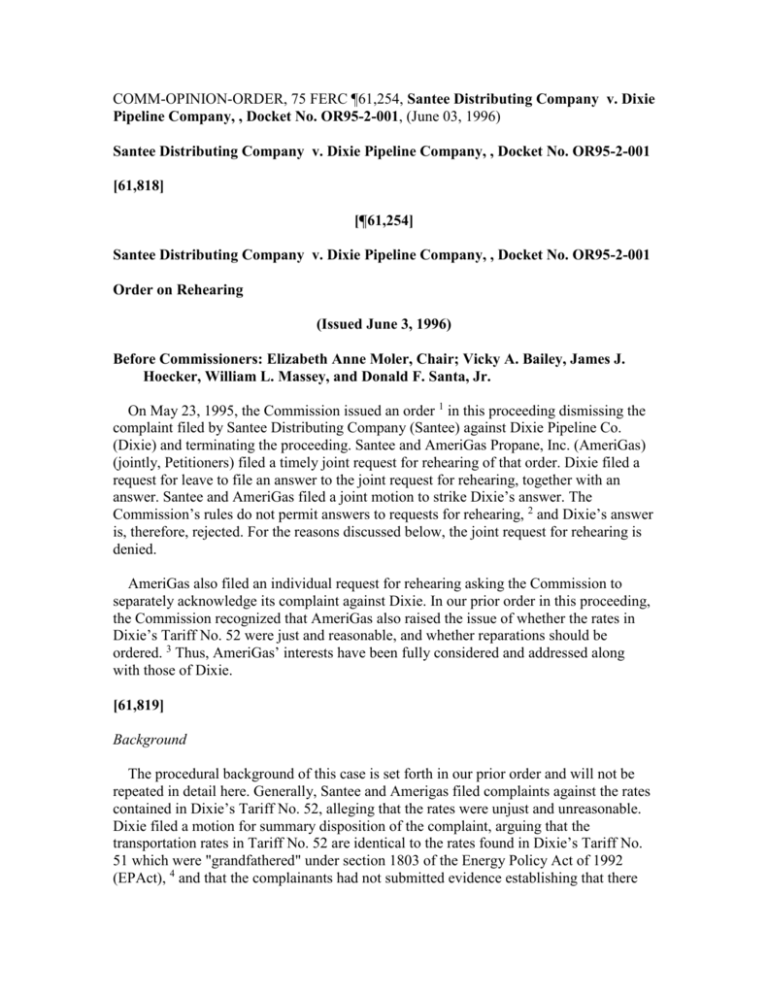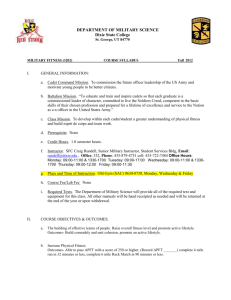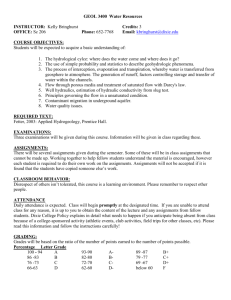Order on Rehearing
advertisement

COMM-OPINION-ORDER, 75 FERC ¶61,254, Santee Distributing Company v. Dixie Pipeline Company, , Docket No. OR95-2-001, (June 03, 1996) Santee Distributing Company v. Dixie Pipeline Company, , Docket No. OR95-2-001 [61,818] [¶61,254] Santee Distributing Company v. Dixie Pipeline Company, , Docket No. OR95-2-001 Order on Rehearing (Issued June 3, 1996) Before Commissioners: Elizabeth Anne Moler, Chair; Vicky A. Bailey, James J. Hoecker, William L. Massey, and Donald F. Santa, Jr. On May 23, 1995, the Commission issued an order 1 in this proceeding dismissing the complaint filed by Santee Distributing Company (Santee) against Dixie Pipeline Co. (Dixie) and terminating the proceeding. Santee and AmeriGas Propane, Inc. (AmeriGas) (jointly, Petitioners) filed a timely joint request for rehearing of that order. Dixie filed a request for leave to file an answer to the joint request for rehearing, together with an answer. Santee and AmeriGas filed a joint motion to strike Dixie’s answer. The Commission’s rules do not permit answers to requests for rehearing, 2 and Dixie’s answer is, therefore, rejected. For the reasons discussed below, the joint request for rehearing is denied. AmeriGas also filed an individual request for rehearing asking the Commission to separately acknowledge its complaint against Dixie. In our prior order in this proceeding, the Commission recognized that AmeriGas also raised the issue of whether the rates in Dixie’s Tariff No. 52 were just and reasonable, and whether reparations should be ordered. 3 Thus, AmeriGas’ interests have been fully considered and addressed along with those of Dixie. [61,819] Background The procedural background of this case is set forth in our prior order and will not be repeated in detail here. Generally, Santee and Amerigas filed complaints against the rates contained in Dixie’s Tariff No. 52, alleging that the rates were unjust and unreasonable. Dixie filed a motion for summary disposition of the complaint, arguing that the transportation rates in Tariff No. 52 are identical to the rates found in Dixie’s Tariff No. 51 which were "grandfathered" under section 1803 of the Energy Policy Act of 1992 (EPAct), 4 and that the complainants had not submitted evidence establishing that there had been a substantial change in Dixie’s economic circumstances, as required by the EPAct. Santee responded that Tariff No. 52 is not grandfathered because it cancelled Tariff No. 51 and imposed a new service charge of six cents per barrel for odorization service. Moreover, Santee argued, even if the Tariff No. 52 rates were grandfathered, its protest showed that there had been substantial changes in the economic circumstances of Dixie and the nature of the service it provided. AmeriGas also argued that Tariff No. 52 is not afforded the grandfather protection of the EPAct because it became effective after enactment of the EPAct and it made changes to its predecessor tariff. In the May 23, 1995 order, the Commission found that the rates contained in Tariff No. 52 are "grandfathered" under the provisions of section 1803 of the EPAct. 5 The Commission also held that the relevant period of time for determining whether there has been a substantial change in economic circumstances is the period since the enactment of the EPAct, i.e., October 24, 1992. The Commission found that most of the data submitted by Santee on this issue related to periods before that date and was, therefore, not a basis for showing changed circumstances within the meaning of the statute. The Commission stated that Santee had not presented evidence of throughput for 1994, but that Dixie had submitted an exhibit that showed that deliveries increased only 2.8 percent from 1993 to 1994. Similarly, the Commission stated, Santee’s evidence of revenues and expenses did not go beyond 1993. The Commission concluded that Santee had not shown a substantial change in economic circumstances. Therefore, the Commission dismissed the complaint and terminated the proceeding. Discussion A. The Grandfathered Status of Tariff No. 52 In their joint request for rehearing, Santee and AmeriGas argue that the Commission erred in finding that the rates contained in Tariff No. 52 are entitled to the grandfathered protection of the EPAct. They again assert that Tariff No. 52, which became effective January 1, 1994 and was, therefore, not in effect for the 365 days preceding enactment of the EPAct, did not carry forward the Tariff No. 51 rates, but changed those rates by adding a six cents per barrel surcharge for odorization. The Tariff No. 51 rate is not carried forward, they repeat, because the total rate paid by the shipper for the same service is five percent higher. Petitioners also argue that the Commission’s suggestion that the odorization charge, but not the underlying rate, could be challenged is erroneous because it ignores the changes in the costs of other components of the total rate, which may have decreased. Further, they argue, this approach incorrectly assumes that the odorization component of Tariff No. 51 had no cost. 6 They argue that the Commission’s order establishes an undesirable precedent whereby a pipeline may escape Commission review and employ a backdoor device to increase rates via a surcharge by separately charging for a service once included as part of its underlying rates. We continue to disagree with Petitioners’ claim that the added charge for odorization changed Dixie’s transportation rates, as Petitioners have offered nothing on rehearing to convince us otherwise. Therefore, we affirm our conclusion that the transportation rates in [61,820] Tariff No. 51 and 52 are the same. Moreover, as explained in our prior order, the grandfather provision of the EPAct by its terms deems rates, not the tariffs that reflect those rates, to be just and reasonable. Since the Tariff No. 51 grandfathered transportation rates were carried forward into Tariff No. 52, it is irrelevant that Tariff No. 52 replaced Tariff No. 51 after the date of enactment of the EPAct. Accordingly, we also affirm our conclusion that the transportation rates reflected in Tariff No. 52 are deemed just and reasonable. In Order No. 561-A , 7 the Commission stated that the grandfathering provision of the EPAct protects the vast majority of rates in existence on the date of enactment. The Commission explained that to allow a protestant of a proposed increase to a statutorily protected rate to challenge the whole rate, and not just the proposed increase, would remove the protection of section 1803(a). Therefore, the Commission concluded that a protestant is limited to challenging the increment of the proposed increase, and not the underlying grandfathered rate. 8 Similarly, allowing a grandfathered rate to become the subject of a complaint outside the limitations of section 1803(b) merely because a surcharge is added to the rate would defeat the intent of the EPAct. In this case, the sixcent odorization charge is not subject to the grandfather protection of the statute and the parties may pursue a complaint as to that portion of the rate without satisfying the changed circumstances burden of section 1803(b). However, as we held in our prior order, the underlying rate is not subject to a complaint unless the required showing of changed circumstances has been met. We affirm our determination that the transportation rates in Dixie’s Tariff No. 52 are grandfathered under the EPAct. B. Substantial Change in Circumstances In their request for rehearing, Petitioners argue that the Commission erred in concluding that the complaint was deficient, and in dismissing the complaint because it did not contain data for 1994. They state that 1994 data was not available at the time Santee filed its complaint, and that by denying them a hearing, the Commission denied them the right to discovery, which would have produced the most current economic data from Dixie. Moreover, Petitioners argue, 1994 data is now available and confirms that there have been dramatic increases in Dixie’s total revenues, net income, and dividend payments. Petitioners also state that the Commission unfairly criticized their complaint because it did not use Dixie’s overall cost of service in its economic analysis. For a party challenging a pipeline’s rates, they assert, the only generally available data is the data in the pipeline’s Form No. 6, 9 and this data does not allow a comparison of a pipeline’s revenues with the cost of service that would be used to determine its rates. 10 Petitioners also state that there has been a change in the nature of the service provided within the meaning of the statute because previously odorization was included in the tariff rate. Contrary to Petitioners’ suggestion, the Commission did not dismiss the complaint simply because it did not contain data for 1994. The Commission dismissed the complaint because it did not meet the statutory requirement that the complaint present evidence that establishes a substantial change in economic circumstances occurred after the enactment of the EPAct. Nevertheless, as Petitioners point out, 1994 data are now available, and therefore we will consider this information in determining whether the statutory requirement has been met. Petitioners state that the data in their exhibit A indicate that over the period 1987-1994 and in 1994, there have been dramatic increases in Dixie’s total revenues, net income, and dividend payouts. Specifically, Petitioners assert that Dixie’s average annual dividend on book equity was 165 percent for 1987 to 1993, and was 236 percent in 1994. Further, they assert, Dixie’s product barrel-miles increased by 3.4 percent annually between 1987 and 1993, and by 3.1 percent between 1993 and 1994. Moreover, they state, Dixie’s net income increased by 2.1 percent annually over the 1987 to 1993 period and by 10.7 percent between 1993 and 1994. This means, they argue, that Dixie’s revenue and net income increased by more than 25 percent for the period 1987 to 1994, and should not be grandfathered as just and reasonable. [61,821] As held in the May 23, 1995 order, the relevant period of time for determining whether there has been a substantial change in economic circumstances is the period after the enactment of the EPAct, i.e., October 24, 1992. Evidence of change prior to that date is irrelevant. The problem with Petitioners’ exhibit A is, as was the case with the data submitted in support of the complaint, that it includes in its calculations, and relies on to show change, data from years prior to October 24, 1992. We have reviewed Dixie’s FERC Form No. 6 for the years 1992 to 1995. The data on those Forms, which was also relied on by Petitioners, shows that operating revenue per thousand barrel-miles was $2.34 in 1992, that it decreased to $2.30 in 1993, increased to $2.40 in 1994 and increased to $2.42 in 1995. Net income per thousand barrel-miles was $.55 in 1992, increased to $.56 in 1993 and to $.60 in 1994, but then decreased to $.55 in 1995. cost of service per thousand barrel-miles increased from $1.80 in 1994 to $1.86 in 1995. These changes are not substantial. Rather, they are relatively minor, merely reflecting normal fluctuations in business operations. Almost all pipelines experience these minor changes in operating circumstances from year to year. Thus, if these types of variations were deemed to be substantial, the grandfather protection of the EPAct would be a nullity. C. Standard to be Met by A Complainant Santee and AmeriGas also argue that the Commission erred in holding that under the EPAct, it is not enough for a complainant to raise a factual issue. Petitioners argue that the Commission should have given the shippers an opportunity for discovery to show that the rates are not grandfathered, but are unjust and unreasonable. Petitioners state that under section 13(1) of the Interstate Commerce Act (ICA), a complainant is required only to state the facts briefly and, if those facts provide a basis for investigation, the Commission must investigate the complaint. 11 There is no requirement, petitioners argue, that a complainant must prove its allegations with "evidence." Petitioners quote Order No. 561 which states that a complainant will simply be required to state reasonable grounds for believing that the rate is unlawful. 12 Contrary to Petitioners assertion, the EPAct specifically provides that a person may not file a complaint challenging a rate grandfathered under the EPAct unless "evidence is presented to the Commission which establishes that a substantial change has occurred after the date of enactment of [the] Act (A) in the economic circumstances of the oil pipeline which were a basis for that rate, or (B) in the nature of the service provided which was the basis for that rate." 13 While the just and reasonable standard of the ICA remains, the EPAct has established a separate, more rigorous standard for challenging grandfathered rates. A complainant who merely raises a factual issue, without more, does not meet this standard. D. Right to Reparations Finally, Petitioners argue that they have been denied reparations for at least the sixcent odorization charge. The Commission has made clear that the six-cent odorization charge is not subject to the grandfather protection of the EPAct. Petitioners, however, have not challenged the odorization charge, nor sought reparations for the amount of the charge paid. The Commission orders: The joint request for rehearing is denied. -- Footnotes -[61,818] 1 71 FERC ¶61,205 (1995). 2 18 C.F.R. §385.713 (d)(1) (1995). 3 71 FERC ¶61,205, at p. 61,752 (1995). [61,819] 4 As discussed in our prior order, the EPAct became effective on October 24, 1992 and provides that oil transportation rates that had been in effect for the 365-day period ending on the date of enactment are deemed just and reasonable if they were not subject to a complaint, protest, or investigation during that time. Therefore, such rates are grandfathered under the statute and are not subject to a complaint unless "evidence is presented to the Commission which establishes that a substantial change has occurred after the date of enactment of [the EPAct] in the economic circumstances of the oil pipeline which were a basis for the rate; or in the nature of the services provided which were a basis for the rate." section 1803 of the EPAct. 5 42 U.S.C. §7172 note. 6 Petitioners cite Arizona Electric Power Co-op., Inc. v. United States, 816 F.2d 1366 (9th Cir. 1987), and state that there the court held that the Staggers Act limits statutory protection to the original rate, and does not extend protection to rate increases. They assert that this precedent is applicable here. While we do not agree that decisions under the Staggers Act are controlling here, nonetheless, the Commission’s decision to apply the grandfather protection of the EPAct to the underlying grandfathered rate, but not to an increase above that rate, is consistent with the outcome in the cited case. [61,820] 7 Revisions to Oil Pipeline Regulations Pursuant to the Energy Policy Act of 1992, FERC Statutes and Regulations ¶31,000 at p. 31,105 (1994). 8 In Association of Oil Pipelines v. FERC, No. 94-1538, slip op. at pp. 35-6 (D.C. Cir. May 10, 1996), the court affirmed the Commission’s conclusions in Order No. 561-A . 9 Santee states that the Commission has urged complainants to rely on Form No. 6 data, citing Order No. 561 , FERC Statutes and Regulations ¶30,985 at p. 30,963 (1993). 10 Santee states that the reason for this is that Form No. 6 does not require the inclusion of either the trendedoriginal-cost equity rate base, or the amortization cost associated with that rate base. However, the Commission now requires the inclusion of page 700 which includes the cost of service. This information is available for Dixie from 1993 forward. [61,821] Petitioners state that the Commission’s order is inconsistent with the order in Lakehead Pipeline, L.P., 71 FERC ¶61,338 (1995), because in Lakehead the Commission considered a protest that did not challenge the pre-existing rate as a sufficient complaint to challenge the grandfather provisions of the EPAct. However, the issue in Lakehead was whether a pleading captioned as a protest, and filed within the 365-day period prior to the enactment of the EPAct, was also a complaint against existing rates. Because the pleading specifically challenged the existing rates in effect prior to the filing of the new rates as unjust and unreasonable under section 13(1) of the Interstate Commerce Act, the 11 Commission held that it was a complaint despite its label. The protest/complaint in the Lakehead proceeding was filed prior to the effective date of the EPAct, and thus not subject to section 1803(b) requirements. The Lakehead decision does not support Petitioners’ argument. 12 FERC Statutes and Regulations ¶30,985 at p. 30,956 (1994). However, the quote cited by Petitioners refers to complaints against existing rate levels established under indexing, not those against grandfathered rates, and therefore is inapposite. 13 Section 1803(b) (emphasis added).






